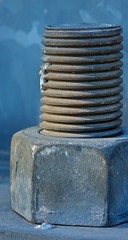 My first Mechanical Turk experiment asked for the worker's favorite engineering book. See my previous post for a little more background.
My first Mechanical Turk experiment asked for the worker's favorite engineering book. See my previous post for a little more background.This HIT has not received many responses, but I'm not very surprised. There are still assignments open on Mechanical Turk if you wish to contribute.
I asked the following questions:
- What is the title of your favorite book on the subject of Engineering? The book might be your favorite because it is fun to read, because it has great ideas, because it is so useful, or some other reason.
- Who is the author of your favorite book on the subject of Engineering? This should be the author of the book you mentioned above.
- What engineering specialty does this book apply to? Civil engineering? Software engineering? Engineering in general?
- Why is this your favorite engineering book? Is it practical? Entertaining? Or something else?
- Do you have any feedback? If you're curious, the results of this survey will likely end up on www.engineeringadventure.com
Artificial Intelligence (3rd Edition) (A-W Series in Computerscience)
Author: Patrick H. Winston
Specialty: Artificial Intelligence/Software Engineering
Reason: Very well written and covers many topics. I took Prof. Winston's class and this got me interested in the field, and I have since then followed a career path in AI and machine learning.
Civil Engineering Reference Manual for the PE Exam
Author: Michael R. Lindeburg
Specialty: Civil
Reason: It is efficient and practical. Most needed information for general civil engineering issues are included in this book.
Feedback: I will try to remember to check it out. I'm curious how many other relevant turkers there are.
Post-Capitalist Society
Author: Peter Drucker
Specialty: industrial engineering / industrial psychology
Reason: Peter Drucker wrote "The Post Capitalist Society" more than ten years go, just as the Internet was starting to come on line. He was prescient in the view that the information of the world would begin to upwell and then overflow. His discussion of the commodification of information, the need to train people how to search and research, the psychology (and growing frustration and dropping out) of the rapid evolution of society are coming true. The evolution of knowledge work into low, medium, and high skill sets are something I struggle to implement in the IT system architecture and user interfaces I help implement. Seeing information as a new commodity, a product to be processed, sorted, transformed, and handed off to users in a final and finished form on demand is becoming critical to apply process improvement methodologies to the IT world.
Water: The Fate of Our Most Precious Resource
Author: Marq de Villiers
Specialty: Civil Engineering with an emphasis toward our water resource
Reason: Unlike other mundane engineering books, the flow (pardon my pun) of this book is smooth as it describes the various challenges and engineering feats concerning the water industry. In fact, I have lent the book to other friends and family members who are not of an engineering background, but have exactly been left impacted by the central message. It is that central message is sometime that I try to instill to up and coming engineers back at my alumnus school; that the field of engineering is laid out by formulas and pratical sense, but our ultimate work is dictated by social constructs and attitudes. Most people in America expect to have water, which is defined as a luxury, though really it is a resource. Anyway, it is a very enjoyable read.
Feedback: Good luck finding engineering books, they are certaintly rare, or at least those which are a good read.
* You can help me and my publisher by buying the book using These links. In association with Amazon.

No comments:
Post a Comment